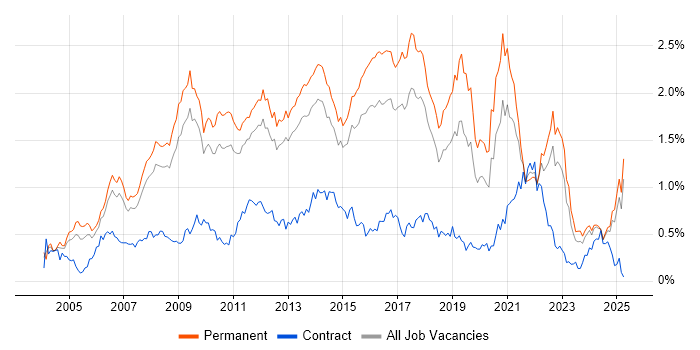Object-Oriented Programming (OOP)
England > East of England
The table below provides summary statistics and salary benchmarking for jobs advertised in the East of England requiring OOP skills. It covers permanent job vacancies from the 6 months leading up to 18 January 2026, with comparisons to the same periods in the previous two years.
| 6 months to 18 Jan 2026 |
Same period 2025 | Same period 2024 | |
|---|---|---|---|
| Rank | 144 | 156 | 120 |
| Rank change year-on-year | +12 | -36 | +11 |
| Permanent jobs citing OOP | 9 | 24 | 29 |
| As % of all permanent jobs in the East of England | 0.21% | 0.69% | 1.05% |
| As % of the Processes & Methodologies category | 0.29% | 0.79% | 1.23% |
| Number of salaries quoted | 9 | 11 | 28 |
| 10th Percentile | - | - | £38,775 |
| 25th Percentile | - | £62,500 | £60,000 |
| Median annual salary (50th Percentile) | £25,000 | £65,000 | £65,000 |
| Median % change year-on-year | -61.54% | - | - |
| 75th Percentile | - | £96,250 | £88,438 |
| 90th Percentile | £27,200 | £105,000 | £115,000 |
| England median annual salary | £60,000 | £60,000 | £60,000 |
| % change year-on-year | - | - | -14.29% |
All Process & Methodology Skills
East of England
OOP falls under the Processes and Methodologies category. For comparison with the information above, the following table provides summary statistics for all permanent job vacancies requiring process or methodology skills in the East of England.
| Permanent vacancies with a requirement for process or methodology skills | 3,129 | 3,031 | 2,365 |
| As % of all permanent jobs advertised in the East of England | 74.01% | 87.30% | 85.53% |
| Number of salaries quoted | 1,844 | 1,176 | 1,826 |
| 10th Percentile | £27,750 | £30,000 | £26,875 |
| 25th Percentile | £34,000 | £42,500 | £37,737 |
| Median annual salary (50th Percentile) | £50,000 | £55,000 | £52,500 |
| Median % change year-on-year | -9.09% | +4.76% | -4.55% |
| 75th Percentile | £65,000 | £72,500 | £67,500 |
| 90th Percentile | £80,000 | £80,000 | £83,125 |
| England median annual salary | £55,000 | £60,000 | £60,000 |
| % change year-on-year | -8.33% | - | -4.00% |
OOP
Job Vacancy Trend in the East of England
Historical trend showing the proportion of permanent IT job postings citing OOP relative to all permanent IT jobs advertised in the East of England.

OOP
Salary Trend in the East of England
Salary distribution trend for jobs in the East of England citing OOP.

OOP
Job Locations in the East of England
The table below looks at the demand and provides a guide to the median salaries quoted in IT jobs citing OOP within the East of England region over the 6 months to 18 January 2026. The 'Rank Change' column provides an indication of the change in demand within each location based on the same 6 month period last year.
| Location | Rank Change on Same Period Last Year |
Matching Permanent IT Job Ads |
Median Salary Past 6 Months |
Median Salary % Change on Same Period Last Year |
Live Jobs |
|---|---|---|---|---|---|
| Essex | +1 | 7 | £25,000 | -76.19% | 14 |
| Hertfordshire | +2 | 1 | £25,000 | -61.54% | 6 |
| Norfolk | - | 1 | £33,000 | - | 5 |
| OOP England |
|||||
OOP
Co-Occurring Skills & Capabilities in the East of England by Category
The following tables expand on the one above by listing co-occurrences grouped by category. They cover the same employment type, locality and period, with up to 20 co-occurrences shown in each category:
